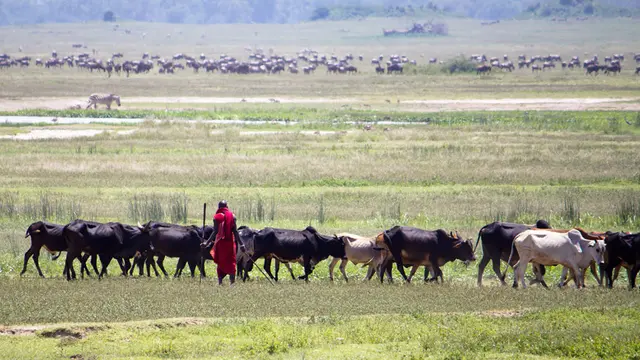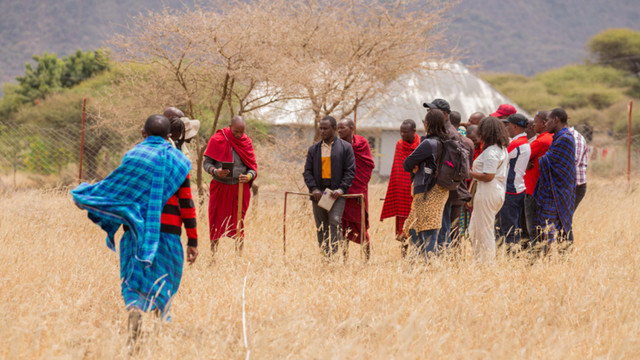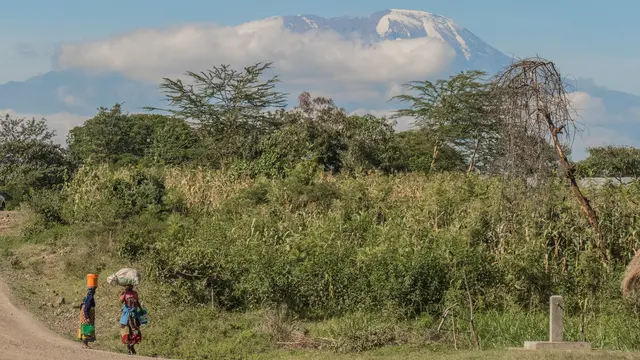A community of doers: celebrating the CBA conferences, and looking forward
As CBA9 delegates convene in Nairobi, Pablo Suarez, associate director at the Red Cross Red Crescent Climate Centre reflects on what makes the conference a regular event in his calendar.


CBA9 starts with opening speeches - but will quickly make way for films and games (Photo: Matt Wright/IIED)
Think back to a decade ago. "Global warming" was still the predominant label for what many people saw as an obscure, rather incomprehensible topic. It involved atmospheric chemistry with too many unknowns, and pertained to a remote, impossibly distant future.
In 2005, I was a researcher on climate and disasters, and had been exploring how to communicate forecasts to subsistence farmers in southern Africa. The results of our investigations were unambiguous: understanding and addressing climate risks required the active, meaningful engagement of vulnerable communities.
In retrospect the finding felt obvious, but nobody seemed to be talking about the role of marginal people in adapting to a changing climate. As an academic there wasn't much one could do to get the big picture; there was no community of practice for community based adaptation.
And then came CBA.
Getting my feet dirty
As an Argentinian based in Boston working on sub-Saharan Africa, fellow academics thought that heading for Bangladesh was inexplicable. What for? Some global conference on community something-or-other? Spending four days with your feet in the mud in some village before some formal sessions?
Yet I now see that moment, that first international conference on community-based adapatation (CBA) to climate change, as the beginning of something new, something tranformational. Arriving to the event venue in Dhaka was like finding my ecosystem niche.
There were people from all over the world, from government officials and important donors to applied researchers to NGO workers and farmers' leaders. While clearly there was a lot of brainpower in the plenary room, there was a distinct sense that this was a community of doers: of people and institutions actively trying to make things happen.
The CBA organisers seemed keen to immerse participants in intensely interactive ways of exploring the issue. The diversity of topics and perspectives was surprising and illuminating. Discussions and debates were rich, deep, and full of concrete possibilities.
The air was filled with a sense of motivation, of purpose, of sincere dedication to a cause that was becoming more and more relevant for a planet that was failing to address the defining issue of our century. And, for the first time in my experience, that conference felt like it was serious fun.
Innovative formats
As CBA continued to evolve over the years, one of its most distinguishing traits was the pursuit of innovative formats for sessions and activities:
- Field trips: to my knowledge, no other climate conference allocates almost half of its time to getting participants immersed in the actual places where vulnerable people are confronting changing climate risks and trying ways to adapt. The field visits are a unique feature that continues to open eyes and strengthen bonds
- Film: CBA was a leader in embedding a film festival so that artists and organisations could showcase the voices from the climate frontlines, opening the door for the UNFCCC climate conferences and other formal events to consider approaches that critically examined the use of video tools for climate issues and proposed ways to engage conference participants as filmmakers (see for example the publication 'Beyond the film: innovations in the participatory use of film at international conferences on climate' (PDF))
- 'Out of the box' sessions: In their pursuit of new ways of involving people, CBA organisers established the 'out of the box' agenda items, to bring participants outside of their comfort zone, where magic can happen. These sessions involved new ways of presenting, sharing and debating experiences and ideas, and have been consistently ranked as the most appreciated sessions in post-event surveys, and
- Games: CBA was a pioneer in opening the door to the Red Cross Red Crescent Climate Centre's work on participatory games for learning and dialogue (PDF), which offers a playful yet analytically rigorous way to examine the delays, feedbacks, thresholds, trade-offs and other aspects of the complex dynamic systems that shape climate vulnerabilities and capacities at the community level. Because of the space created by CBA, our participatory games reached broad and deep, with sessions on topics ranging from the gender dimensions of food insecurity in rural Kenya, to disaster management policy decisions in the White House.

As we convene in Nairobi for CBA9, it is exciting to anticipate that we will be enjoying the company of so many old friends, and making so many new ones.
This event has become an annual tradition, a dynamic ritual of exploration of who we are as CBA practitioners, where we are, and where we need to go. And it asks the tough questions that we rarely ask of ourselves, such as the role of monitoring and evaluation in community based adaptation, or why is it that everybody shares their good practices but not many seem to be willing to publicly share what we can learn from failure.
There are tough choices ahead of us; we need to rethink what we are doing. Otherwise the task of supporting community based adaptation will be forever swamped by old and new obstacles that grow more rapidly than the funding available to support our work.
There's a lot to do, and these conferences have been giving us not only the knowledge and the network to do it better, but also the motivation to do it more passionately and intelligently. Thank you CBA, and looking forward to much more!
Pablo Suarez is associate director for research and innovation at the Red Cross/Red Crescent Climate Centre, and visiting fellow at Boston University. He has consulted for around 20 international humanitarian and development organisations, working in more than 60 countries. He develops participatory tools for learning and dialogue on climate risk management.


